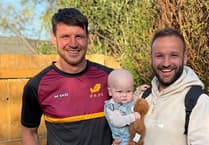A FORMER Tavistock College student, who is currently working to help refugees in famine-stricken Somalia, this week told the Times the situation was 'tragic beyond words'.
Alice Gude, 31, trained as a nurse at Southampton University. She has been working for Medicins Sans Frontiere on the Ethiopia-Somalia border since February, where she has seen the trickle of refugees turn into a flood in recent weeks.
Alice said: 'The start of the situation was apparent from March but it has grown in proportions that I could not have imagined.
'I have seen this project expand from the beginning of March —when there were only 38,000 refugees across two camps, 950 children in our programme, 15 children in our inpatient facility, 12 nurses, 20 community health workers and three expats — to a situation which is tragic beyond words.
'We have been receiving up to 1,000 refugees across the border on a daily basis. The two original camps are double their original capacity at 40,000 each and the third camp has reached full capacity of 24,000 in three weeks — a total of 104,000 in the camps with another 14,000 at the border.
'We now have 9,500 children in our programme, 200 children in our two inpatient facilities, countless support staff, approximately 120 nurses and 40 expats.'
To cope with the emergency, Alice has been recruiting community health workers and now has three teams.
She said: 'The emergency team have been like fireball-angels! They are hard and fast and cut-throat but they have come with vision and, most of all, resources.
'It has been the most incredible experience to have gone from feeling like I was yelling in a vacuum to suddenly things moving and happening.'
Alice said conditions for the refugees were 'dire'.
'This is the worst drought that Somalia has seen for many years. Their crops have failed for many seasons and their livestock are all dying.
'They are coming from many regions and they travel for 12 to16 days of walking to get to the border with minimal food or water.
'At some points the influx was severe and the border pre-registration was unable to cope with the sheer numbers of people. Water was scarce, food and shelter non-existent. They are then moved to the transit centre, where the conditions again are poor, and are finally moved to the camps, which are still not ready for full capacity.
'The total journey takes approximately six weeks, which is enough to destroy the most hardened of Somali people, let alone children. Many families had stories of children and adults dying at some point on the journey to the camps.
'The state they arrive in is shocking: you get used to seeing skinny children but it gets me when they have the look of an old man's face, typical of marasmus — a form of severe malnutrition — or when they stand up they have a bottom similar to an elephant, with folds of skin. It breaks my heart.'
Alice said it was particularly hard to see the many children who arrive in such a bad way that there is very little the volunteer teams could do for them.
'A number of them have died but sometimes they surprise you completely and recover. To see a child that was skin and bones then smile and eat on their own is amazing.
'It is special to see the reaction of the mothers go from complete desolation, that comes across as disinterest, to the joy and love they show once they realise the child will survive,' said Alice, who was appointed to the community outreach section of the camp in May.
She said: 'At first it was difficult to cut my ties with the nurses but it has evolved to be the best job in the whole project.
'I have a local nurse supervising 50 community health workers in each camp and we are able to start making a strong and effective service.
'Some of my team are fantastic and the most enthusiastic, interesting and motivated people I have ever worked with.
'It is so wonderful to work so closely with the refugees themselves and to have full access to all the camps, talking to them, hearing their concerns and sadly witnessing the appalling conditions they live in.'
Alice said the majority of the population were women and children. She said when women refused to be admitted to the inpatient facility as they have four other children and no-one to care for them, it was easy to understand their distress.
'When you ask why they share the Plumpy'nut, the fortified high-energy food we provide to the malnourished children, and they reply they have four other children with nothing to eat, it is hard to give a sensible reply.'
Alice said the emergency team had also brought an anthropologist to work with her in outreach.
'He has many years of experience and is a delight to work with.
'We have a great strategy set up to really strengthen and improve our outreach team for long-term benefit of the programme here, including many shelters in the camps to provide discussion and health promotion.
'It is great to be able to provide these services for the community health workers and make their work easier and more enjoyable. We are looking for a donkey ambulance to service the camps too! Sounds silly, but in practice it will be highly effective to bring the severely sick children to our structure.'
Alice, who has worked as a nurse in London and Australia, said she hoped this article would give people in West Devon a glimpse of the conditions in the Horn of Africa.
She said: 'Sometimes I get fed up with minimal water, red spaghetti every night and working seven days a week, and then I feel embarrassment as I remember that it is a whole world better than wheat and dust, no water and no shelter.
'I can honestly say proudly that what the MSF emergency team are achieving here and providing in this desolate situation is definitely something to be proud of.'
Alice's father, Dr Rupert Gude, who until his retirement worked for many years in Tavistock's Abbey Surgery, is very proud of the work Alice has been doing.
Dr Gude, who is currently working with his wife Annie as volunteer medics in Vanuatu, Western Pacific, said: 'She has worked extremely hard to put the right things in place, recruiting and training staff and supervising.
'We are very proud of her and happy that she has been able to follow her passion and put her skills into amazing good use. She is an example to us all.'
Anyone who would like to donate to Medicin Sans Frontieres can go to http://www.msf.org.uk/supportus.aspx">http://www.msf.org.uk/supportus.aspx




Comments
This article has no comments yet. Be the first to leave a comment.